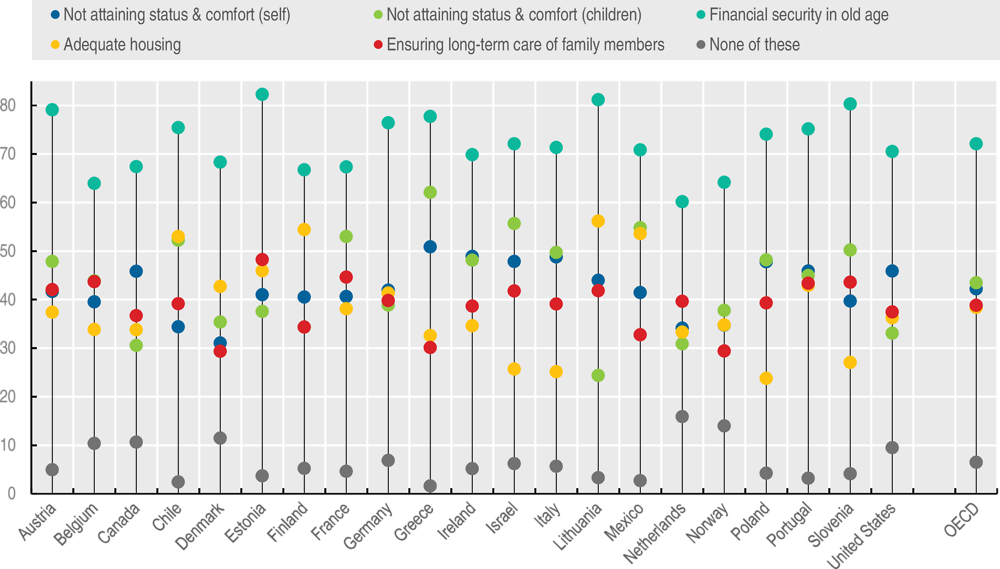Social and economic risk perceptions and concerns
What are people’s top concerns in OECD countries? The OECD’s Risks That Matter survey provides key insights into people’s perceptions of the social and economic risks they face, both in the short-term (over the next year or two) and long-term (beyond the next decade).
Around the world, people worry in the short-term about falling ill and making ends meet. On average across the 21 countries surveyed, slightly over half of respondents list “becoming ill or disabled” as one of the top-three social or economic risks facing them or their immediate family in the next year or two (Figure 3.1). This is the most common concern in 14 of the 21 countries, including some countries with highly developed social protection systems, such as Belgium, Finland and France (OECD, 2019).
Understandably, worries about becoming ill or disabled grow with age. This is most often a top short-term concern for older respondents. Younger people, on the other hand, are frequently worried about securing affordable housing (ibid).
The second most important (short-term) worry in many countries is poverty, with 40-50% of all respondents fearing a struggle to meet daily expenses despite working in the short term. This answer was especially common among those with lower incomes and in countries that were hit hardest by the global financial crisis. Rates were highest in Greece (70.5%), Italy (55.9%), and Mexico (60%). In some countries, especially Mexico, personal security is also a major concern (ibid).
In the longer term, people are most worried about pensions and finances in old age. On average across countries, about 72% of all respondents list old-age finances as one of the top-three long-term concerns facing them or their family, with the rate rising above 80% in Estonia, Lithuania and Slovenia (Figure 3.2). Again, unsurprisingly, older respondents are most likely to pick finances in old age as one of their greatest worries, but many younger people are also concerned about their pensions.
Intergenerational mobility is a key issue for many. On average across the surveyed countries, 60% of parents (those with a child of their own living in the same household) list the risk that their children will not achieve the level of status and comfort that they have themselves as one of their top three long-term concerns. This is the second most common concern for parents, after their own financial security in old age (73%) (OECD, 2019). Reflecting the difficulties many young people face in today’s labour market, younger respondents are more likely than others to have strong concerns about their future prospects. On average across the 21 surveyed countries, well over half of 18- to 29-year-old respondents list attaining the level of status and comfort their parents had as one of their top-three long-term concerns (ibid).
Figure 3.1 and Figure 3.2 present results from the OECD’s 2018 Risks That Matter survey (see Chapter 2 for more information about the survey). To understand people’s short- and long-term concerns, respondents were asked to identify the three greatest risks to themselves or their immediate family from a list of seven risks: becoming ill or disabled, losing a job, affording adequate housing, struggling to meet all expenses, accessing childcare or education, accessing long-term care, crime or violence, or none of the aforementioned choices. Respondents had the option of selecting zero, one, two, or three risks.
Short-term was defined as “in the next year or two”; long-term was defined as “beyond the next decade”.
The survey is implemented online using samples recruited via the internet and over the phone. Sampling is based on a modified form of quota sampling with sex, age group, education level, income level, and worker status used as the sampling criteria. Survey weights are used to correct for any under- or over-representation based on these five criteria. The target and weighted sample is 1 000 respondents per country.
Further reading
OECD (2019), Risks that Matter: Main Findings from the 2018 OECD Risks that Matter Survey, OECD Publishing, Paris, www.oecd.org/social/risks-that-matter.htm.


